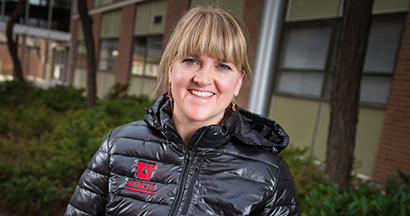

Olympian Alex Wubbels: From Childhood Wish to Reality
For Alex Wubbels being an Olympian wasn’t a lifelong dream – but a wish. “My mom always had a thing for making wishes with the wishbone,” she said. “Every wish I ever made was to make the US ski team and to go to the Olympics.“
For Alex Wubbels being an Olympian wasn’t a lifelong dream – but a wish. “My mom always had a thing for making wishes with the wishbone,” she said. “Every wish I ever made was to make the US ski team and to go to the Olympics.“
Skiing was second nature to Wubbels. As a child she hit the slopes near her Colorado home every day after school. She called it her “babysitter.” At the age of eight she started racing. When her natural abilities became clear, she decided to pursue her dream by attending a school in Utah that would allow her to train and compete as a skier while she also pursued her studies. She was on track to make her wish a reality.
After years of competing on the national and World Cup circuits Wubbles first landed a spot on Team U.S.A. for the 1998 games in Nagano. While all of her training had prepared her for the idea of competing as an Olympian, it hadn’t prepared her for the reality of being at the games. It finally hit her when she sat down for her first meal at the Olympic Village. “We found the only open table and sat. I remember sitting and taking a deep breath and looking up and I was sitting right across from Wayne Gretzy,” she said. “I had this idea of poking him to make sure he was real but on the other hand I was like ‘I can’t poke Wayne Gretzy.’”
Like any competitive athlete Wubbles had her fair share of injuries. In 1993 she tore her ACL. While this is a common injury for skiers it is also a time consuming one, taking on average six months to heal. “It doesn’t matter how much surgery has changed or physical therapy has changed the human body is only able to heal at a certain rate,” she said.
Wubbels was able to easily come back from that ACL tear but then in 2000 multiple injuries to her back had her questioning if she could continue skiing competitively. The pain was such that at times she couldn’t bend over to pick up her skis or even lift her legs. Doctors told her the best surgical option was to have her back fused. “I knew a lot of hockey players who had their backs fused, but not competitive skiers,” she said. “I was nervous because there was no path that had been laid before me to insure I would be able to succeed athletically.”
Wubbels had her back fusion surgery in April of 2001 and began focusing on getting back on the snow to prepare for the 2002 games in her adopted hometown of Salt Lake City. Five months after surgery she was up on her skis. “Seven months, almost to the day, was when I qualified for the 2002 Olympic team,” she said.
The back injury didn’t sideline Wubbels from another moment of Olympic glory, but it did get her thinking about what she wanted to do once her professional ski career was over. Luckily, she had a team surrounding her that was dedicated not only to making her a top athlete but a well-rounded person as well. “I remember my sports psychologist giving me a personality test,” she said. “Afterwards he was going through careers that matched and he said nursing and I thought ‘I’m gonna do that.’”
The focus she brought to her training as an Olympian Wubbels then brought to her training as a nurse. She worked with nurses at the Huntsman Cancer Institute as well as nurses striving to make a legislative difference on Utah’s Capitol Hill before deciding to apply to the critical care internship program. She now cares for patients in the critical care burn unit at University of Utah Hospital. Every day she uses her past experiences as a patient to relate to those she cares for, and applies the same steely determination she learned as a competitive skier to push for the best outcomes for them. “I definitely don’t think you need to be an Olympian to be an excellent nurse, but it doesn’t hurt,” she said.